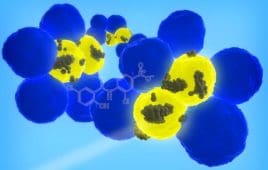Treating breast tumors with two cancer drugs simultaneously may prevent endocrine resistance by attacking the disease along two separate gene pathways, scientists at the University of Illinois found in a new study. The two drugs used in the study, selinexor and 4-OHT, caused the cancer cells to die and tumors to regress for prolonged periods,…
Unmuting Large Silent Genes Lets Bacteria Produce New Molecules, Potential Drug Candidates
By enticing away the repressors dampening unexpressed, silent genes in Streptomyces bacteria, researchers at the University of Illinois have unlocked several large gene clusters for new natural products, according to a study published in the journal Nature Chemical Biology. Since many antibiotics, anti-cancer agents and other drugs have been derived from genes readily expressed in Streptomyces,…
Mouse Study Suggests Vaccine Strategy for Immunocompromised Patients
Study: Damaged Liver Cells Undergo Reprogramming to Regenerate
Study Explores Risk Factors Linked to Chikungunya and Dengue Outbreaks
In one of the largest studies of its kind, researchers analyzed chikungunya and dengue outbreak data from 76 countries over a period of 50 years, focusing on regions across the Indian Ocean that are hard hit by these and other mosquito-borne infectious diseases. The analysis of 1959-2009 data revealed that population density and proximity to…
New CRISPR Technology ‘Knocks Out’ Yeast Genes with Single-Point Precision
The CRISPR-Cas9 system has given researchers the power to precisely edit selected genes. Now, researchers have used it to develop a technology that can target any gene in the yeast Saccharomyces cerevisiae and turn it off by deleting single letters from its DNA sequence. Such genome-scale engineering – in contrast to traditional strategies that only target a…
Discovery of Unsuspected Flexibility Offers New Pathway to Cancer Drug Development
Drug-Delivering Nanoparticles Seek and Destroy Elusive Cancer Stem Cells
University of Illinois researchers are sending tiny drug-laden nanoparticles on a mission to seek and destroy cancer stem cells, the elusive and rare cells that can cause cancer to come back even when years have passed since the initial tumor was treated. In a study led by Dipanjan Pan, an Illinois professor of bioengineering, researchers…
Combating Antiviral Drug Resistance With Dynamic Therapeutics
Antibiotic Breakthrough Shows Opening to Overcome Gram-Negative Bacterial Defenses
Scientists report that they now know how to build a molecular Trojan horse that can penetrate gram-negative bacteria, solving a problem that for decades has stalled the development of effective new antibiotics against these increasingly drug-resistant microbes. The findings appear in the journal Nature. Led by University of Illinois chemistry professor Paul Hergenrother, the scientists tested their approach…
Scientists Test Nanoparticle Drug Delivery in Dogs
At the University of Illinois, an engineer teamed up with a veterinarian to test a bone cancer drug delivery system in animals bigger than the standard animal model, the mouse. They chose dogs – mammals closer in size and biology to humans – with naturally occurring bone cancers, which also are a lot like human…











